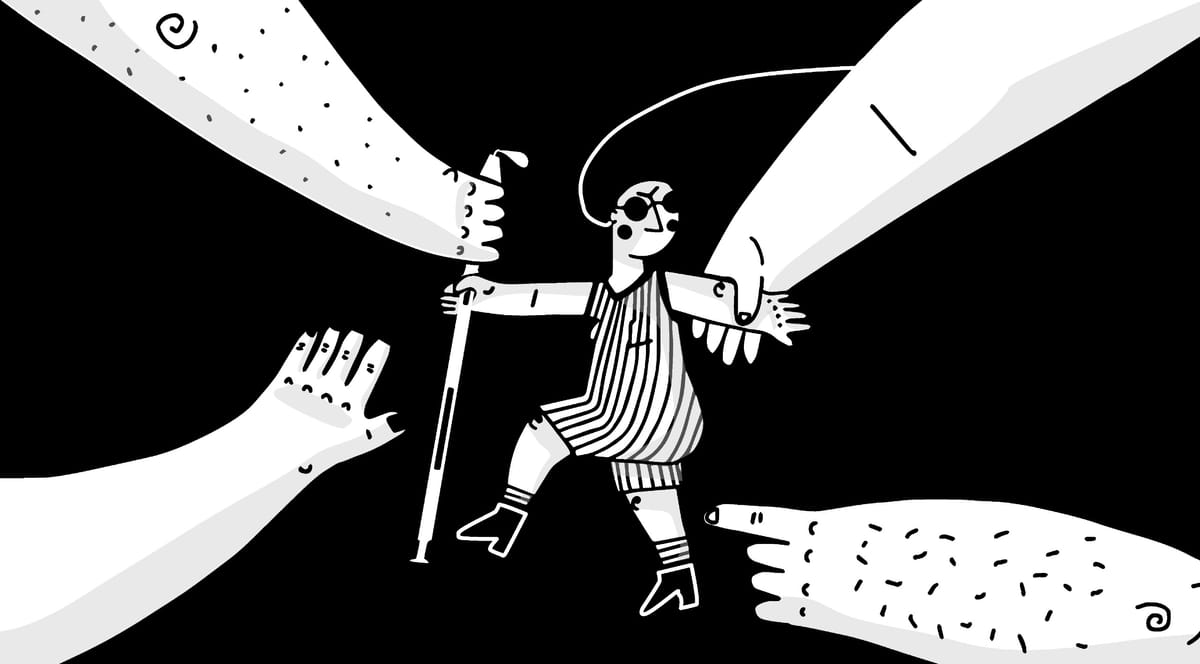This week we’re bringing you an excerpt from a personal essay published by our friends over at Unbias The News. Click here to read the full article.
When “Help” Hurts: How #MeToo Gave Me A Vocabulary To Claim Disability Rights
Written by Ria Andriani, Edited by Ankita Anand, Illustration by Viola Gesmundo
Originally published: 7 October 2021 You stand on the platform to catch the train in the morning. It arrives. You prepare to board. Suddenly someone grabs you to “help” you step over the gap. There’s no instructional video on “how to help a disabled person get on a train”. So they pull, push, lift or twist you.
It’s supposed to be a mark of decency, proof that you live in a caring society. Except throughout the whole exchange, you didn’t ask for help, and you certainly did not give your consent.
You swallow the annoyance clogging your throat. “Did I just let someone grab me?” But it has already happened. The person is lost in the crowd. And in any case, no real harm was done.
You might not have agreed to be helped. But surely the least you can do is say thank you to the stranger, right?
For those with visible disabilities, such as people who are blind or use a wheelchair, catching a train is a public affair involving verbal and physical contacts. The assumption is of course you want help, an assumption which cuts across countries and cultures.
#MeToo Gave Words To My Feelings
As a blind person who grew up in Indonesia, and now lives in Australia, I find it hard to articulate why unsolicited help is a serious issue. The problem, however, is real, pervasive and can cause serious harm.
After the #MeToo era, I began to have words to describe what is wrong: words such as unsolicited and consent. In recent years, we have further tried to explain sexual consent with a cup of tea:
Words such as enthusiastic consent have entered our everyday language. Yet these words do not describe mundane interactions when traveling by public transport.
“If you’re by yourself, does someone take your arm to help you get on the train?” my Indonesian step-mother asked me. “Yes, but most often I refuse. Especially if they just grab me.” – “But that’s rude,” she pointed out.
Rudeness from a woman isn’t acceptable. When coming from a woman with disability, it is doubly unacceptable.
Take help, show gratitude
Getting help was considered part of my entitlement as a disabled person in Indonesia. But if I was harmed when being “helped”, it was supposed to be my fault. To begin with, a better person would’ve been more careful. They would’ve worn non-revealing clothes as well. Moreover, they would’ve had the skills to travel independently. In all this, whether my consent was sought or not becomes inconsequential.
The same scenario persists in Australia, though here, at least, I am able to hold some ground because when I came here I was no longer a minor. I was living and moving around independently.
Living in Australia, taking public transport is how I access most places.
Most journeys involve fending off unwanted help. People take my arm, my shoulder, my waist, my white cane, and occasionally my dog guide leash. More often than not they’re an expression of kindness, other times of chivalry. So when I twist, turn, yell or refuse, it provokes confusion and anger in them. After all, I am expected to be grateful.
My reasons for saying no should be private – and irrelevant. Besides, there is no time for long explanations in the brief span between the opening and closing of the train door. Yet I take on the burden of justifying my refusals, and assuaging bruised egos.
Read the rest of the story on Unbias The News.
You can also join Hostwire, where members get alerts about trainings and journalism opportunities in general.
Thanks for reading, and we’ll be back in your inbox soon!

